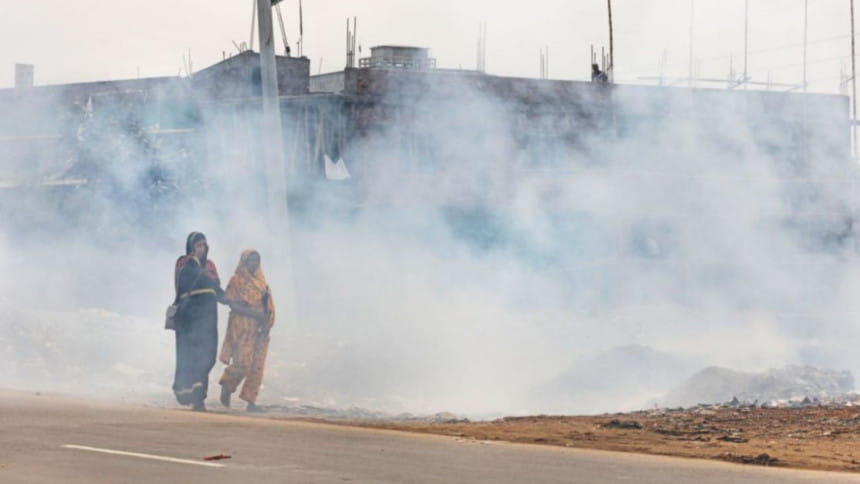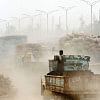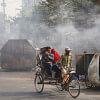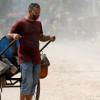Raising our children amidst poisonous air

This is no city to raise your children in," a friend was telling me the other day. "Either you leave the country or leave the city and go somewhere where your kids don't have to breathe poison." Sadly, I found no reason to disagree with her. My friend is totally at a loss as to what to do with her five-year-old son as the kid has been suffering from asthma and chronic respiratory complications which are getting worse as he is growing up. He is now totally dependent on medication and nebulisation when the symptoms get worse. Being a mother of a two-and-a-half-year-old son, I know how it feels.
While previously, at any random gathering of friends, the issues of discussion circled around the challenges of raising our children in a society which is becoming increasingly intolerant and the safety of our children outside of the home; for the last couple of months, the discussions invariably ended with the health problems of our children. Because we are faced with a more tangible problem—the toxic air of this city which has been taking its toll on our children.
On April 3, US-based organisations Health Effects Institute and Institute for Health Metrics and Evaluation in their report, "The State of Global Air 2019", revealed that indoor and outdoor air pollution led to 1.23 lakh deaths in Bangladesh in 2017. It also said that the life of a South Asian child will be shortened by 30 months on average as they grow up in the current high levels of air pollution. Several such reports were published in recent months which were quite alarming.
Last March, another global survey on air quality found that Bangladesh has the most polluted air in the world while Dhaka is the second most polluted capital city. Dhaka has been among the most polluted cities in global indices for many years now. But this time it ranked worse. The amount of PM (particulate matter) 2.5, widely regarded as the pollutant with the most health impact of all commonly measured air pollutants, in Dhaka's air was found to be way above the acceptable limit. "Due to its small size, PM 2.5 is able to penetrate deep into the human respiratory system and from there to the entire body, causing a wide range of short- and long-term health effects." Researchers have also found the level of lead, cadmium, zinc, chromium, nickel, arsenic, manganese and copper to be extremely high in Dhaka's air. Although these pollutants are dangerous for people of all ages, children are particularly vulnerable to these harmful elements.
Recent data released by the World Health Organization (WHO) show that air pollution has a vast and terrible impact on children's health and survival. Globally, 93 percent of all children live in environments with air pollution levels above the WHO guidelines. It says that more than one in every four deaths of children under five years is directly or indirectly related to environmental risks. And although only 10 percent of the world population is under five years old, they bear 40 percent of the burden of environment related diseases.
Children are particularly vulnerable to air pollution because their lungs are not fully developed like adults. According to the British Lung foundation, most children only have 20 percent of an adult's lung mass at birth. They breathe in more air more quickly than adults do and so breathe in far greater quantities of air pollutants than an adult does. Also, children have lower ability to fight off the effects of air pollution. So, they are more likely to develop respiratory complications related to air pollution.
Air pollution affects children so much that it can even hamper their mental development. A number of studies in both the US and Europe have revealed that exposure to particulate matter is associated with the development of autism spectrum disorder. Researchers have also found evidence to suggest that air pollution can cause poor neurocognitive development and attention deficit hyperactivity disorder in children.
Last December, I took my son to a paediatrician, a professor of BSMMU, as he was having breathing difficulty along with a bad cough. The doctor told me that it is pretty common for children to get these types of problems during the dry season—from November till February—when the city's air is the most polluted. After prescribing a number of medicines, he suggested that my son should not be exposed to dust inside or outside the home. In the doctor's chamber, there were 15 to 20 kids aged around six months to seven or eight years old. Unsurprisingly, most of them came with respiratory complications.
Now that the dry season is over, I don't see any change in the city's air quality. Last month, the daily Prothom Alo reported that the average time of air pollution has been dangerously increasing in the city. While Dhaka's air remained polluted for an average of 120 to 160 days of the year previously, in 2018 the city's air remained extremely polluted for at least 197 days.
While brick kilns and vehicles running on fossil fuels with higher level of sulphur have been identified as the major sources of air pollution in the country, in Dhaka, it's the chemicals emitted from vehicles as well as dust from construction works that are mostly contributing to air pollution.
Our children are not even safe inside cars. According to the British Lung Foundation, "even when you're in your car, you and your children can breathe in polluted air—from traffic fumes, petrol vapour, tobacco smoke and chemicals. In fact, air pollution can often be higher inside your car than outside."
So the situation is as bad as it can get. What we should do now is go for cleaner sources of energy and better waste management systems to prevent open burning of harmful chemicals, enforce the existing environmental laws, enact a new specific law to address this deadly problem, and of course, make people aware of the health risks associated with air pollution. Since air pollution is a global problem, we should take lessons from other countries who are better handling it. The future of our children will be defined by how we act now: whether we remain silent spectators or we take urgent pro-active measures to clean the city's air from these harmful elements.
Naznin Tithi is a member of the editorial team at The Daily Star.











Comments